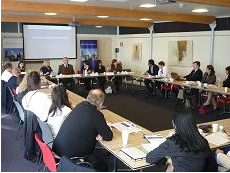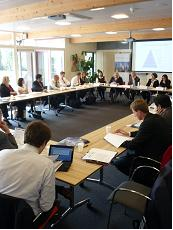Expert Meeting Report on “The Use of Diplomatic Assurances in Terrorism-related Cases: In Search of a Balance Between Security Concerns and Human Rights Obligations”
General Remarks
The Expert Meeting contained an impressive lineup of speakers in various fields of expertise. This contributed to a multifaceted debate in which intricate arguments were given from a judicial, legal, and policy perspective.
Prof. Dr. Theo van Boven, who chaired the Expert Meeting, began with an introduction on the use of Diplomatic Assurances (DAs), in which he also related some of his own experiences on the subject as former UN Special Rapporteur on Torture. ICCT Research Fellow Dr. Bibi van Ginkel proceeded to present the main points from the discussion paper she co-authored, including the core legal boundaries surrounding the use of DAs, the concept of ‘soft vs. hard DAs’, and the Policy and Jurisprudence Pyramids that were formulated.

The first set of speakers at the Expert Meeting concerned national government representatives. A representative from the Canadian Ministry of Foreign Affairs and International Trade set out the Canadian policy on DAs. The United Kingdom sent four representatives to the meeting, originating from the British Foreign and Commonwealth Office, UKBA Special Cases Directorate and OSCT, and submitted a position paper prior to the start of the meeting, which can be downloaded here.
The second set of speakers consisted of Dr. Christiane Höhn (Advisor to the EU Counter-Terrorism Coordinator) and Julia Hall (Human Rights Watch). Dr. Höhn provided an overview of the current state of play of the DAs debate in the European Union context, as well as a potential area in which it could have a higher level of involvement: rule of law and human rights capacity building in third countries. Hall, who has authored numerous reports on the use of DAs for both Human Rights Watch and Amnesty International, gave an overview of the general skepticism that surrounds the use of DAs in the NGO community. The Expert Meeting closed with an open discussion in which audience members were also encouraged to give their views on the subject.
Main Arguments for the Use of Diplomatic Assurances
There was a general agreement by government representatives with one of the main points from the ICCT discussion paper – that the use of DAs is not the first choice of tools to deal with terrorist suspects. It was stressed that governments always have prosecution as a first choice, but it is not always possible for a variety of reasons, including complications of using intelligence material during trials and a lack of sufficient evidence that could be submitted to court. There was also a clear rejection of the ICCT paper’s assertion that the use of DAs revolves around balancing national security with human rights. There are thus no attempts by governments to either weaken the Chahal Principle or avoid the non-refoulement obligations that are set by international treaties.

It was stressed that governments are advocates of ‘hard’ DAs, and therefore they will only employ them with strenuous judicial reviews and strong enforcement mechanisms. The current system of DAs used by the UK and Canada is claimed to be considerably robust despite its potential shortcomings, given that having fool-proof assurances that an individual will not get tortured is not feasible. Government representatives conceded that DAs are dependent on the ‘good faith’ of the receiving country to a certain degree.
Furthermore, it was argued that rather than challenging international law, DAs reinforce it. Instead of viewing DAs as potential loopholes to avoid international obligations, they should be viewed as safeguards that play an important role in ensuring that individuals are not abused or tortured when transferred to other countries. And while there was an acknowledgement that DAs are not legally binding, countries that break them may be penalised on a diplomatic level by the sending countries as has been done in the past.
Main Arguments Against the Use of Diplomatic Assurances
It was clear by the arguments given by some of the speakers as well as by comments and questions by audience members that a general skepticism remains about the effectiveness of DAs in ensuring that individuals do not suffer torture or other forms of inhumane treatment. Monitoring of prisoners in foreign prisons remains a difficult task, given that prisoners may be afraid to inform if they are being tortured due to fears of reprisals. To illustrate this point, the example of Maher Arar was given (which is also mentioned in the ICCT paper), in which he explains that he did not confess to Canadian authorities that he was being tortured during their visits due to fears of further beatings by the guards.
It was further argued that since DAs are not legally binding, they do not put enough pressure on the receiving countries to comply with them. There have been various cases in which a receiving country’s breach in DAs has not led to a breakdown in diplomatic relations with the sending country. There is also what could be labeled as a “perverse incentive” for the sending country to not want to find out if an individual is being tortured, given that this would generate bad publicity and put into question the use of DAs.
Recent developments with the use of DAs also show some worrying signs. They include an increasing use of DAs for cases that are not related to terrorism, which lowers the standard of transferring individuals due to being national security threats. A pattern of sending numerous Chechen prisoners to Russia has also emerged, which has come under scrutiny due to the ‘inhumane’ conditions that are present in Russian prisons. Such inhumane conditions have been confirmed by recent Wikileaks cables, such as a 2008 cable from a US ambassador to Russia in which he described Russian prisons as ‘massive instruments of punishment’.
Areas of Agreement?
The ICCT paper called into question the stance by NGOs and human rights groups. Beyond criticising the use of DAs and its current flaws, their concern is that a potentially effective DAs system could still be condemned for causing ‘an island of legality amongst a sea of abuse’. Such a stance may cause the threshold for an agreement to be too high and further complicate potential compromises that could be made by different sides. This argument was countered by claiming that a system of DAs is likely to always be inherently flawed due to the reliance on the good faith of receiving countries as well as the unfeasibility of establishing a monitoring system that ensures an individual is not abused or tortured. The ‘island of legality’ argument thus follows from a premise that will never be reached anyway.
Conclusions and Policy Recommendations
- DAs should only be used reluctantly because of all the risks. Each case should be assessed on its own merits, and general policies in that respect should be avoided.
- To avoid impunity, other measures should be improved in order to avoid the need for DAs. Investing in capacity building in the receiving states to improve the circumstances of detention, and to reform the judicial system are considered more sustainable solutions to the problem.
- Stronger collaboration between national governments and NGOs. Currently, both sides tend to operate separately, and more collective efforts could be made between the two.
- A stronger role for the European Union in terms of capacity building. Whereas the European Court of Human Rights is heavily involved in cases of DAs, EU bodies have generally remained in the periphery. The outcome of the Othman case currently before the ECHR was awaited, which would clarify further the interpretation of the non-refoulement principle under the European Convention for Human Rights.
- Enforcement mechanisms for DAs should continue to be developed and strengthened. All sides seemed to agree that more could be done to ensure that countries comply with DAs.
- The non-refoulement and Chahal principles should not be scaled down on any level, and ensuring that they are preserved and reinforced should continue to be a top priority for all parties involved.
The Expert Meeting Paper authored by ICCT Research Fellow Dr. Bibi van Ginkel LL.M. and Federico Rojas can be downloaded here.



